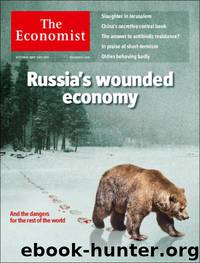The Economist (20141122) by calibre

Author:calibre [calibre]
Language: eng
Format: epub
Tags: news, The Economist
Publisher: calibre
Published: 2014-11-21T01:34:32.941000+00:00
Charlemagne
Cold comfort
Russia will be the biggest test for Europe’s new foreign-policy supremo
Nov 22nd 2014 | From the print edition
ALL of Europe rejoiced when the European Space Agency deposited Philae, a probe the size of a kitchen appliance, on the surface of a comet 300m miles (480m km) from the Earth. It was like throwing a dart blindfolded across an ocean and hitting the bullseye. Philae fell silent soon afterwards, but not before dispatching reams of data and a shot of optimism to a continent that has had little to cheer. Closer to home the European Union finds it harder to exert influence—even over its neighbourhood.
Russia’s intervention in Ukraine is providing an early test for the EU’s new high representative for foreign policy, Federica Mogherini, who previously served (albeit briefly) as Italy’s foreign minister. NATO is warning of a renewed build-up of Russian troops and kit in eastern Ukraine. The recent sham elections in two pro-Russian separatist regions in the Donbas were “respected” if not recognised by Moscow. The Minsk ceasefire accords signed in September by Ukraine, Russia and the separatists are being honoured only in the breach. Petro Poroshenko, Ukraine’s president, is preparing for “total war”.
How did Europe allow such devastation on its doorstep? EU officials cite the claim that, whereas in 1989 Ukraine was at roughly the same level as Poland, today it is three times as poor. The implication is that with the right policies Ukraine’s turn from its European destiny may be corrected. It was this thought that inspired the brave protesters, many flying EU flags, who filled the Maidan in Kiev a year ago. They sought not just the downfall of Mr Poroshenko’s predecessor, Viktor Yanukovych, who had bowed to Russian pressure to reject an EU trade deal, but an end to the corruption and thievery that had defined their country since independence. The real battle-cry of the Maidan was for a modern, European-style state. Instead, Ukraine has become a bloody war zone and an economic basket-case.
Ukraine was always going to be difficult. By late 2004, when the Orange revolution brought pro-Europeans to power in Kiev, the EU had begun its expansion to the east. Then “enlargement fatigue” left poorer ex-Soviet countries like Ukraine in the cold. The European neighbourhood policy, designed to bring about political and economic change in the EU’s neighbours without the offer of membership, was a dismal failure. It substituted technocratic gradualism for hard-headed politics and so failed to respond to the needs of individual countries and regions.
But the trickiest problem is Russia. Vladimir Putin decided that a Europe-leaning Ukraine was a threat to Russian interests. His meddling, notably the annexation of Crimea and the invasion of the east, has been unpredictable and opportunistic, and emblazoned with nationalist ideology, whether revanchist talk of Novorossiya or attacks on America. His “Eurasian Economic Union” has ambitions to rival the EU, even if its membership is limited so far to Armenia, Belarus and Kazakhstan.
The scales have certainly fallen from European eyes. On November 16th Mr Putin left a G20 summit early after being harangued by his fellow leaders.
Download
This site does not store any files on its server. We only index and link to content provided by other sites. Please contact the content providers to delete copyright contents if any and email us, we'll remove relevant links or contents immediately.
Waking Up in Heaven: A True Story of Brokenness, Heaven, and Life Again by McVea Crystal & Tresniowski Alex(37786)
Still Foolin’ ’Em by Billy Crystal(36351)
Cecilia; Or, Memoirs of an Heiress — Volume 1 by Fanny Burney(32548)
Cecilia; Or, Memoirs of an Heiress — Volume 2 by Fanny Burney(31947)
Cecilia; Or, Memoirs of an Heiress — Volume 3 by Fanny Burney(31931)
Fanny Burney by Claire Harman(26597)
Empire of the Sikhs by Patwant Singh(23073)
We're Going to Need More Wine by Gabrielle Union(19034)
Hans Sturm: A Soldier's Odyssey on the Eastern Front by Gordon Williamson(18575)
Plagued by Fire by Paul Hendrickson(17405)
Out of India by Michael Foss(16848)
All the Missing Girls by Megan Miranda(15958)
Cat's cradle by Kurt Vonnegut(15335)
Pimp by Iceberg Slim(14488)
Molly's Game by Molly Bloom(14133)
Bombshells: Glamour Girls of a Lifetime by Sullivan Steve(14057)
For the Love of Europe by Rick Steves(13913)
Leonardo da Vinci by Walter Isaacson(13318)
4 3 2 1: A Novel by Paul Auster(12375)
